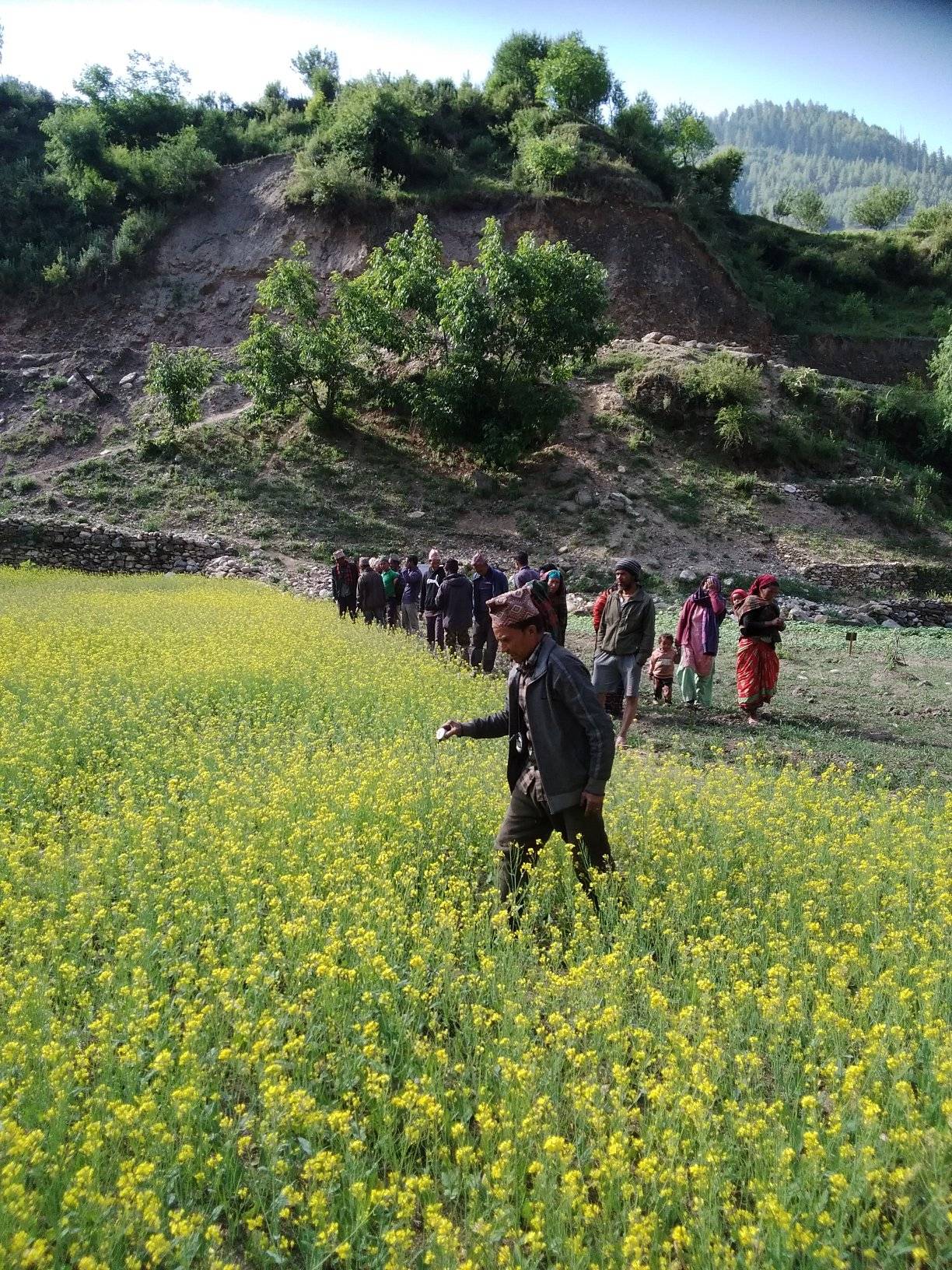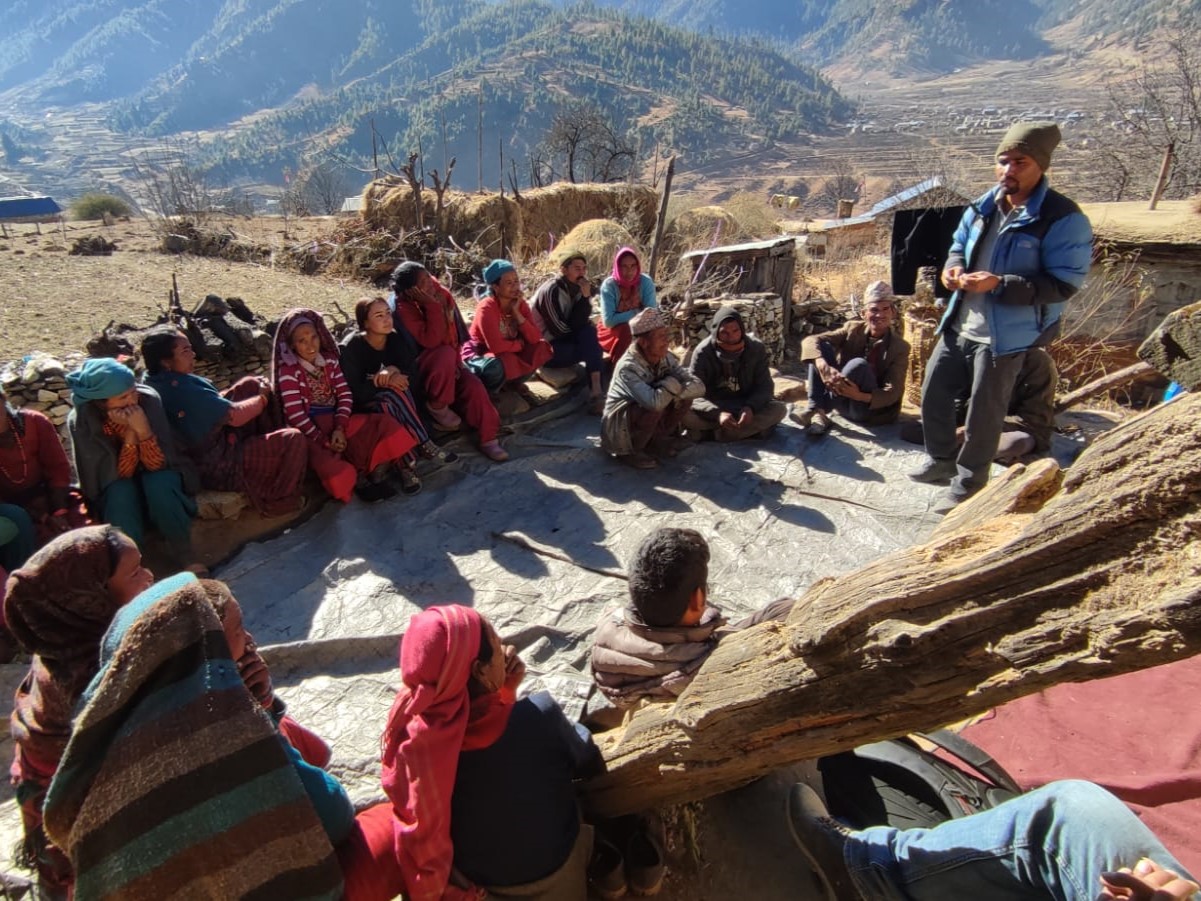Nepalese agriculture: The buzz about bees

A carpenter bee (Xylocopa) visits the flower of an apple tree, contributing to the pollination of this economically important crop. Credit - Tom Timberlake.
The buzz about bees: Embedding sustainable pollination management into Nepalese agricultural systems
Insect pollinators provide one of the most tangible links between biodiversity and agricultural production. You only need to put a netting bag over an apple branch to see the remarkable impact of these tiny insects - without the multitude of bees, flies, butterflies, and wasps which normally buzz from tree to tree pollinating the apple flowers, most fruits simply won’t develop. And it’s not just apples – as many as three quarters of all crops grown around the world rely on insect pollinators for their production.
In Jumla - a mountainous district of western Nepal where 80% of the population rely on smallholder farming, half of agricultural income comes directly from apple production. So, when Amaraj Bohora, an apple farmer from Jumla, removes the pollinator-exclusion net from an apple tree on the Darwin Initiative project Demonstration Farm, and finds only two apples, the penny drops. Without healthy populations of pollinating insects on his farm, his livelihood will be ruined. Alongside the loss of income, his family’s nutrition will suffer too. The yields of nutritious crops which feed and nourish his family - like beans, buckwheat, chilies, pumpkin, and gourds - will all similarly decline in the absence of pollinators.
"Pollination is an under-valued and under-utilised agricultural input which has the potential to increase the food and economic security of smallholders across the world, whilst simultaneously benefitting biodiversity."
The situation is the same for smallholder farmers across the world. Most of the cash crops (crop grown for its financial value) grown on smallholder farms are heavily dependent on insect pollinators, including coffee, cacao, cashew, apples, almonds, and cardamon. Likewise, many of the crops that provide key micronutrients to farming families – fruits, vegetables, nuts, and pulses – also rely on visits from pollinators. Unlike industrialised farmers and urban populations, smallholders lack the flexibility and financial support systems to shift their farming practices and diets if crop yields fall. In short, smallholders simply can’t afford to lose their pollinators.
Given their immense reliance on pollinators, why are so few smallholder farmers even aware of this crucial ecosystem service? In Jumla, for example, only 14% of farmers are aware that bees benefit their crops. Lack of education is part of the problem, but there is also a tendency to take for granted a service which is provided free-of-charge. However, with pollinators declining at alarming rates across most of the world, we can no longer afford to take this service for granted.

The good news is that pollinator declines can be reversed very quickly – at least at a local level – through simple actions like planting more flowers, leaving areas of natural habitat, and reducing pesticide use. These are low-cost, low-tech solutions which are easily achievable for smallholder farmers and can increase crop yields in just one to two years. It is estimated that Nepalese farmers could increase their economic revenue by 30% through increasing the abundance and diversity of insect pollinators on their farm. The aim of our Darwin Initiative Pollination project is to realise this opportunity by embedding pollinator conservation and management into Nepalese agricultural systems through outreach work, capacity building, and policy change.
"Meeting the soaring food demands of the global population in a way that minimises environmental impacts is a central challenge of the 21st Century. Achieving this goal will require us to find new ways of farming which utilise services provided by native ecosystems."
Led by the University of Bristol, UK and implemented in Nepal by HERDi and Local Initiatives for Biodiversity, Research and Development (LI-BIRD), with partners from Tribhuvan University, Agriculture and Forestry University and the Ministry of Land Management, Agriculture and Cooperatives (MoLMAC) in Karnali Province, Nepal, the first component of the project is to increase pollinator awareness amongst farmers and work with them in participatory Farmer Field School (FFS) sessions to devise and test effective pollination management strategies. Already, our pollinator awareness activities have reached 4,500 farmers (65% women) across Jumla District, representing 6% of the working age population. By teaching farmers what insect pollinators do for them and demonstrating the direct yield benefits of pollination management on our three project farms, farmers are inspired to adopt these practices on their own farms.
Extension workers are another crucial part of the agricultural system, providing direct support and advice to farmers across the country. Our project has reached out to more than 100 agricultural extension workers and government officers in Karnali Province, providing them with an in-depth pollination training course, as well as a series of education resources which they can use to support farmers across the province.

Finally, scaling up to the policy level, the project team is working closely with partners in MoLMAC as well as other stakeholders from the policy, research, and industry sectors, to formulate a Pollinator Action Plan for Karnali Province. This policy-prescriptive pollinator strategy is embedding pollinator conservation and management into all levels of the agricultural system in Karnali Province, ensuring long-term benefits for both people and pollinators. With enough political and public momentum, and an eye-catching case study from Karnali Province, the hope is that our work can be scaled-up through a National Pollinator Strategy to make Nepal a regional leader in pollinator conservation.
Meeting the soaring food demands of the global population in a way that minimises environmental impacts is a central challenge of the 21st Century. Achieving this goal will require us to find new ways of farming which utilise rather than degrade the services provided by native ecosystems. Pollination is an under-valued and under-utilised agricultural input which has the potential to increase the food and economic security of smallholders across the world, whilst simultaneously benefitting biodiversity. As scientists, conservationists, development workers, policy makers, and farmers, we all have a role in making sure these benefits are felt across the world.
Written by Tom Timberlake. For more information on this Darwin Initiative Main project 29-001, led by the University of Bristol, please click here.

 Back
Back